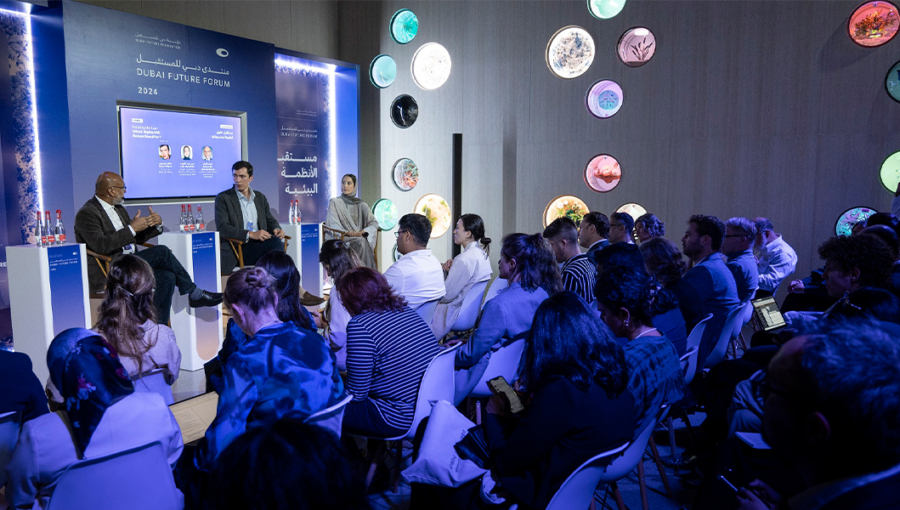Laila Abdullatif, Director General of Emirates Nature-WWF, has emphasised the critical role of nature in addressing climate change, describing it as one of humanity’s most powerful allies. Speaking at the Dubai Future Forum 2024, she called for greater investment in nature-based solutions as part of comprehensive climate strategies.
During a panel titled ‘Futuring the Law: Which Rights Will Nature Stand For?’, HE Abdullatif highlighted the mounting financial cost of climate-related losses, warning that damages in frontline communities could reach USD 800 billion by 2030.
“We know that nature is a massive ally when it comes to climate change, and nature-based solutions have the potential to reduce climate intensity by 26%,” she said.
HE Abdullatif stressed the need to protect natural defences such as coral reefs and mangrove forests, which act as critical flood barriers.
“We need to be much more serious and intentional about implementing adaptive measures,” she said. “Nature underpins our economic systems, strengthens community bonds, and is vital to both our physical and emotional well-being. It’s the foundation of meeting our human needs.”
Justice Md. Ashraful Kamal of the Supreme Court of Bangladesh called for stronger legal frameworks to protect the environment, stating: “Natural law is the supreme law. If our policies and actions don’t align with it, nature will impose its own justice. Without a guardian, who will take responsibility for rivers and ecosystems? Someone must act on their behalf.”
Longevity & Resilience
In a session titled ‘Longevity Cities: Utopia or Dystopia?’, Dr Makoto Suzuki, Director at the Okinawa Research Center for Longevity Science, shared his insights into extending lifespans.
“Longevity is not just about extending life but celebrating it by bringing together people from multiple generations,” Dr Suzuki said.
His colleague, Christal Burnette, encouraged young people to embrace the Okinawan philosophy of ‘Nankurunaisa’, meaning “Don’t worry, be happy” emphasising harmony, respect, and a balanced way of life. Rajiv Ahuja from the American Society on Aging explained that future “longevity cities” will aim to facilitate healthy behaviours across all life stages”.
In a separate session titled ‘Pharma’s New Frontier: How Is Outside Innovation Reshaping Drug Discovery?’, Sarah Sharif, Founder of Experimental Civics, predicted that “hyper-personalised medicine” will revolutionise healthcare. Saeed Alnofeli, of in5 – TECOM Group, emphasised the importance of collaboration: “We need to listen to startups, align with governments’ visions, and ensure seamless integration.”
Engineering Nature for the Future
The session ‘Wild Comeback: Will We Engineer Nature Resilience in the Future?’ explored the use of genetic engineering to enhance coral reef resilience against climate change.
“Coral reefs occupy less than 1% of the ocean floor but support over a quarter of marine life,” said Dr Liv Williamson from Revive & Restore. “They are essential for biodiversity and serve as natural barriers protecting coastal areas from flooding and erosion.”
A panel titled ‘Deeper Underground: Why the Fungi Hype?’ delved into the role of fungi in ecosystems, describing them as “masters of transformation” that enable life by breaking down elements in the environment.
In ‘Earth’s Checkup: What Can We Gain by Connecting Our Wellbeing to Our Planet’s Future?’, Sheikh Majid Sultan Al Qassimi of Soma Mater, Andrew Zolli of Planet Labs, and Dr Jemilah Mahmood from Sunway University Malaysia explored the interdependence of human and planetary health.
The Dubai Future Forum, the world’s largest gathering of futurists, is taking place from 19–20 November at the Museum of the Future. It has attracted over 2,500 experts from 100 countries, convening to discuss and debate the trends shaping humanity’s future.
For more information about the Dubai Future Forum, please visit: www.dubaifuture.ae/dubai-future-forum-2024.
